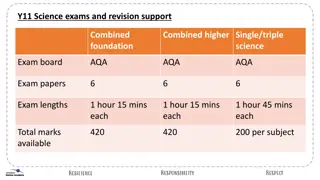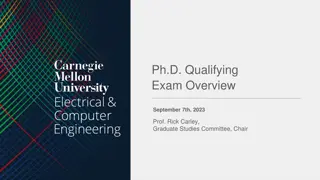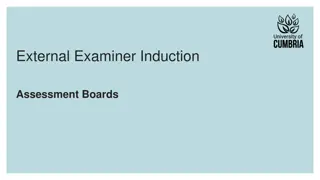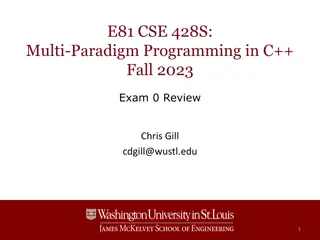Understanding Exam Boards and Degree Classifications
Exam boards play a crucial role in reviewing students' results, making decisions about their degrees, and determining degree classifications. The process involves marking, moderation, and external examining to ensure fairness and consistency in assessment. Before the final exam board, a moderation and scaling board compares module marks with historical averages and other modules to address any significant deviations. The final exam board is crucial for final year students as it determines their degree classifications.
Download Presentation

Please find below an Image/Link to download the presentation.
The content on the website is provided AS IS for your information and personal use only. It may not be sold, licensed, or shared on other websites without obtaining consent from the author. Download presentation by click this link. If you encounter any issues during the download, it is possible that the publisher has removed the file from their server.
E N D
Presentation Transcript
EXAM BOARDS Understanding Degree Classifications and other Exam Procedures 1 Dr Aditi Nafde Chair of the Undergraduate Board of Examiners, SELLL Aditi.Nafde@ncl.ac.uk
2 Marking, moderation, and exam boards INFORMATION FOR ALL STAGES
What is the exam board? 3 The exam board is where we review all students results and make decisions about their degrees: Stage 1 & 2 Boards We make decisions on progress, checking whether students passed their modules and can proceed to the next stage, or whether they need to take resits. Stage 3 Board We make decisions about degree classifications (more info to follow)
4 Marking: your assessment is marked by a member of the teaching team for your module (i.e. the module leader or another lecturer). Quality assurance Then Moderation: another member of academic staff looks at a 10% sample of the work from the module to check the marking is fair and consistent, and following the same standards across the School. If the moderator thinks the marking is out of line, they may suggest that all marks be scaled by an agreed amount. Individual marks are not changed. This is done before the marks are returned to you. Or Second marking: a second member of academic staff marks the assignment independently and then the two markers agree the final mark (applies to Stage 3 independent work e.g. dissertations, CW portfolios, independent essays, extended studies). Plus External Examining: before the exam board, our external examiners (academics from other universities) look at a sample of work from every module to check that the marking is fair and consistent, and follows the same standards as other similar universities (and therefore marks are provisional until after the exam board)
5 Before the final exam board, we have a moderation and scaling board: We look at the average mark for each module and compare it to: Moderation and scaling board The average on that module in previous years The average mark for other modules in that Stage The average overall mark for students in that Stage We consider any possible impacts on performance (for example, disruptions due to industrial action, Covid-19) If we think the marks for the module as a whole are significantly out of line (i.e. more than could be explained by natural variations) we scale all marks on the module by an agreed amount (another reason why marks are provisional until the exam board). Because of the other checks we have in place, we rarely need to do this.
6 Final Exam Board INFORMATION FOR FINAL YEAR STUDENTS
Key Information 7 A group of staff attend, so decisions are not made by just one or two people. Attendees include our External Examiners. They check we are running everything fairly and consistently, in line with other universities. The board is anonymous. Staff do not see student names (or even student numbers)
8 Degree You will be entitled to the award of an Honours degree of the class on the Degree Classification Scale indicated by the final programme average calculated using V C 32 if all the requirements for the award are met. Regulations for Taught Programmes, V. 29. classifications the basics - i.e. if your final programme average is: 50-59 you are awarded a 2:2 60-69 a 2:1 70+ a first.
Programme weightings 9 SELLL degree programmes are weighted 1:2 Your Stage 3 / Stage 4 average counts double your Stage 2 average
Programme weightings 10 SELLL degree programmes are weighted 1:2 Your Stage 3 / Stage 4 average counts double your Stage 2 average Your profile of marks (Stage 2 and Stage 3): Semester 1 modules Semester 2 modules Stage average Final average Final rounded average 60 59 61 56 61 58 52 61 48 64 58 65 55.2 62.8 60.3 Stage 2 Stage 3 Note: Final averages are whole numbers, so >= X.5 round up, otherwise round down Stage 2 average Stage 3 average x 2 55.2 This is a 40 credit module so it counts twice + 125.6 = 180.8 60.3 Divided by 3 to get final average = Final rounded average = 60
11 Linguistics with a Foreign Language A slight variation: Stage 3 (your Year Abroad): as well as your Year Abroad ePortfolio, you have one 20- credit essay/report/project submission If your mark on that 20 credit module is higher than the average of your Stage 2 School of English modules, that mark replaces your lowest SELLL mark for average computation purposes (i.e., not on your transcript)
12 Rounding Stage averages are rounded to the nearest tenth Final averages are rounded to the nearest tenth, and then to the nearest whole number So Stage Average 64.78111 = 64.8 Final Average of 65.74231 = 65.7 = 66 (This does mean that a Final Average of 69.450 = 69.5 = 70)
13 The Board of Examiners must consider whether or not to exercise discretion to award a higher classification of degree when you have a final programme average within two marks of a classification boundary. Regulations for Taught Programmes, V. 29. Borderlines - We consider everyone with an average that ends in an 8 or a 9 (48, 49, 58, 59, 68, 69) as a borderline. Additionally, in 2020-21, as part of the Safety Net we will consider averages ending in a 7 (47, 57, 67) as a borderline.
14 The Board of Examiners shall have regard to the following: Principles of discretion (academic) The overall profile of individual marks achieved in modules Exceptional performance in any particular module (for example research-based modules or an oral examination where this is part of the degree programme regulations). Regulations for Taught Programmes, V. 61. - Exercise of discretion must be consistent, i.e. if we make a decision for one student, we have to make the same decision for a student with the same kind of profile.
15 Principles of discretion The regulations also ask us to consider: When there is a positive assessment of the impact of medical or other mitigating circumstances by the Personal Extenuating Circumstances Committee. Regulations for Taught Programmes, V. 61. (PEC) - At the end of the semester, you will be invited to submit PEC forms telling us about such circumstances.
Summary 16 The University has many processes in place to ensure your degrees are calculated fairly and consistently, and to account for things which may have disrupted teaching (with extra safeguards to account for the unusual circumstances last year). You are not just a number. If you re on a borderline, we will look closely at your profile of marks to consider whether we can exercise discretion. If you have PEC circumstances which affected your performance, we will take those into account.























